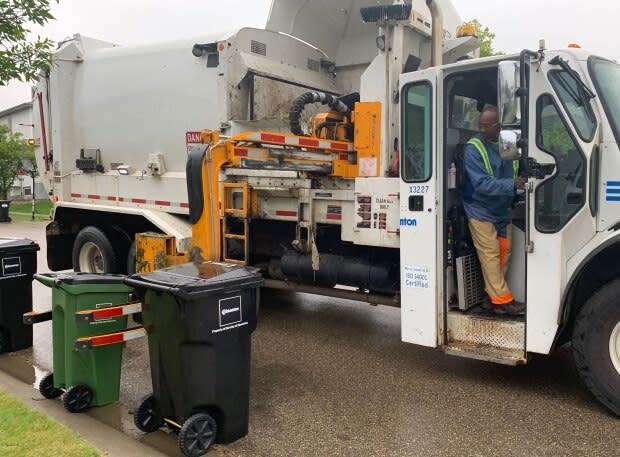Garbage rates could rise slightly ahead of green-bin rollout
Edmonton households could to pay slightly more for garbage pickup next year, after the council's utility committee agreed to a 2.5-per-cent increase on Friday.
That translates to an increase of $1.18 a month for curbside pickup, to $48.26 from $47.08.
People living in multi-unit housing would pay 77 cents more a month for residential bin collection, up from $30.60 to $31.37.
The city's waste services budget will be $212 million for 2020 if council gives final approval at a meeting Dec. 10.
The city plans to transform its waste collection services to a four-part system by mid-2020.
Coun. Ben Henderson said he was pleased part of the rate increase will go toward the new system.
"The fact that they've been able to come in under those circumstances and basically pay for all of that over the next four years, with essentially an inflationary adjustment, I think is pretty remarkable in itself."
Starting next summer, most residents will be asked to put organics in green bins, recyclable materials in blue bags, yard and leaf waste in other bins and residual garbage in black bins.
"I think the really good news here is, it's not going to significantly affect the ratepayer."
About 8,000 households are participating in an organics pilot project that started earlier this year. The rest of the organic waste picked up by the city goes to the landfill, since the Edmonton Composting facility closed permanently earlier this year.
Mike Labrecque, manager of waste services, said the new system will be an improvement on the current one.
"The game changer is moving to source-separated organics," he said.
When the compost facility was at full capacity, it processed 135,000 tonnes of garbage, Labrecque said.
"Half of that is k-cups and contaminants to organics, so when you move to source-separated organics, the system becomes much more efficient."
The transformation started in early 2018 after an audit report showed the city's waste management system had fallen short of international standards in waste diversion and efficiency.
Where will they go?
The city's new organics processing facilities aren't expected to be fully online until 2025.
In the meantime, the city is working on a plan to accommodate the extra organics starting next spring and is looking at several options, including partnering with another municipality.
Labrecque said his department will report back to the committee with a detailed business case in spring 2020 with options for interim organics processing.

Henderson said the public can be confident their food scraps will be composted.
"We have made a commitment that none of that is going to the landfill," he said.
@natashariebe

